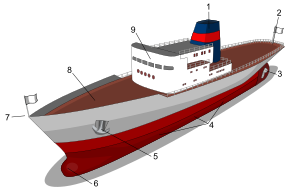
Back حمولة إجمالية Arabic Schiffsmaße#Brutto- und Nettoraumzahl (BRZ, NRZ) German Kruda tunaro Esperanto Kogumahutavus Estonian ظرفیت ناخالص Persian Jauge brute French Bruto tonaža (pomorstvo) Croatian Tonase kotor ID 총 톤수 Korean Tanan kasar Malay

Gross tonnage (GT, G.T. or gt) is a nonlinear measure of a ship's overall internal volume. Gross tonnage is different from gross register tonnage.[1] Neither gross tonnage nor gross register tonnage should be confused with measures of mass or weight such as deadweight tonnage or displacement.
Gross tonnage, along with net tonnage, was defined by the International Convention on Tonnage Measurement of Ships, 1969, adopted by the International Maritime Organization (IMO) in 1969, and came into force on 18 July 1982. These two measurements replaced gross register tonnage (GRT) and net register tonnage (NRT). Gross tonnage is calculated based on "the moulded volume of all enclosed spaces of the ship" and is used to determine things such as a ship's manning regulations, safety rules, registration fees, and port dues, whereas the older gross register tonnage is a measure of the volume of only certain enclosed spaces.
- ^ The gross register ton (GRT) is a unit of volume defined as 100 cubic feet (2.8 m3).
© MMXXIII Rich X Search. We shall prevail. All rights reserved. Rich X Search